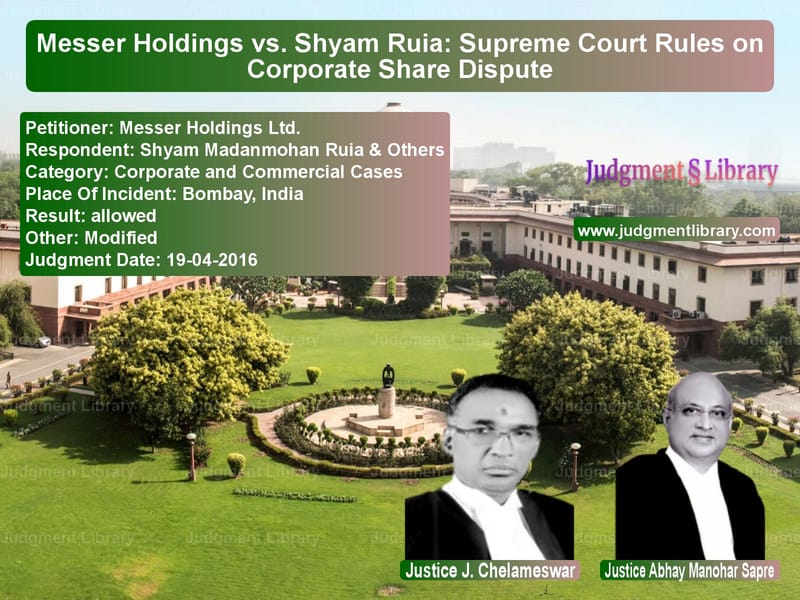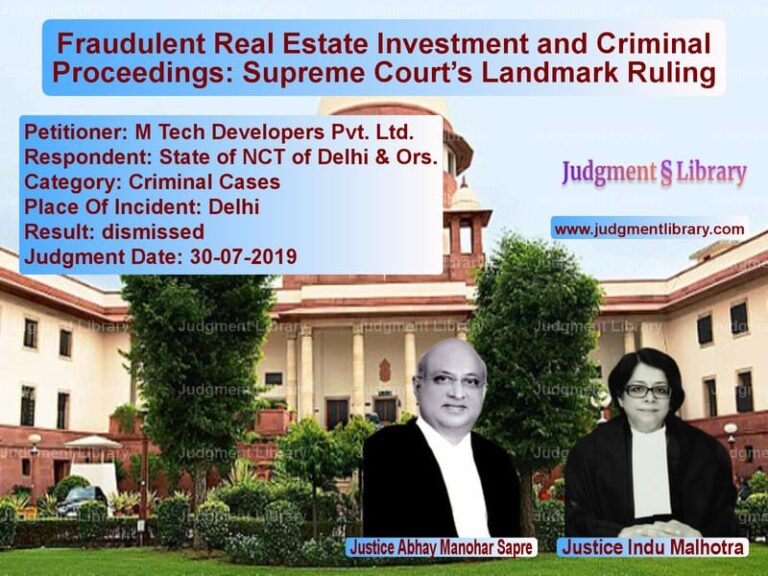Messer Holdings vs. Shyam Ruia: Supreme Court Rules on Corporate Share Dispute
The Supreme Court of India recently delivered a landmark ruling in Messer Holdings Ltd. vs. Shyam Madanmohan Ruia & Others, addressing key legal issues surrounding corporate share purchase agreements, the right of first refusal, and arbitration enforcement. The case involved multiple lawsuits, contractual disputes, and arbitration proceedings spanning several years, ultimately concluding with the Supreme Court’s directive on how corporate transactions and agreements must be upheld.
Background of the Case
The dispute arose between Messer Holdings Ltd. (MHL), an Indian company, and the Ruia family, which controlled Bombay Oxygen Corporation Ltd. (BOCL). Messer Holdings had acquired shares in BOCL through a series of agreements, but the Ruia family contested the validity of these acquisitions, claiming a breach of contractual obligations.
The origins of the case date back to when Messer Griesham GmbH (MGG), the parent company of MHL, entered into a share purchase agreement with the Ruia family. The agreement included specific clauses regarding the right of first refusal (ROFR) for share transfers. However, disputes emerged when MHL sought to transfer shares to a third party without offering them first to the Ruias.
Amid the ongoing dispute, arbitration proceedings were initiated, and multiple lawsuits were filed in the Bombay High Court. While the arbitration tribunal ruled in favor of MHL, the Ruia family continued litigation, challenging the enforceability of the arbitration award.
Key Legal Issues Considered by the Supreme Court
- Whether MHL violated the right of first refusal clause in its agreement with the Ruia family.
- Whether the arbitration tribunal’s award was binding and enforceable.
- Whether the Ruia family could continue litigating despite a settlement agreement.
- Whether the share purchase agreements entered into by MHL were valid under Indian contract law.
- The extent to which courts could intervene in corporate transactions involving multiple stakeholders.
Arguments by the Petitioner (Messer Holdings Ltd.)
- MHL argued that its share purchases were lawful and in compliance with the agreements executed between the parties.
- The arbitration tribunal had already ruled in favor of MHL, making further litigation by the Ruia family unwarranted.
- The Ruia family had accepted settlement terms, precluding them from challenging the agreements later.
- Indian contract law did not prohibit the transfer of shares under the agreement’s existing terms.
Arguments by the Respondents (Shyam Ruia & Others)
- The Ruia family contended that MHL breached the right of first refusal clause, invalidating the share transfers.
- The arbitration award was unfairly decided and should not have been enforced.
- MHL acted in bad faith by attempting to circumvent the agreed-upon contractual obligations.
- The lower courts had correctly ruled in favor of the Ruia family, requiring Supreme Court intervention.
Supreme Court’s Judgment
The Supreme Court ruled in favor of MHL, setting aside the Bombay High Court’s decision and directing that the arbitration award be enforced. The key findings of the judgment were:
- The agreements between MHL and the Ruia family were legally binding, and MHL did not violate the right of first refusal clause.
- The arbitration tribunal had properly considered all aspects of the dispute, and its award was valid under Indian arbitration law.
- Once a party has agreed to a settlement, it cannot re-litigate the same issue in courts.
- The Ruia family’s attempt to continue litigation despite the settlement was an abuse of judicial process.
- Corporate contracts must be upheld to ensure fair commercial practices in India’s business environment.
The Court observed:
“The right of first refusal clause, when interpreted in light of corporate laws and the arbitration agreement, does not prohibit the transaction undertaken by Messer Holdings Ltd.”
The Court further emphasized that judicial intervention in arbitration must be limited and that courts must not allow defeated parties to continue litigation indefinitely.
Implications of the Judgment
- The ruling strengthens the enforcement of arbitration awards in India.
- It clarifies that parties cannot re-litigate matters that have been settled through arbitration.
- It reinforces corporate governance principles, ensuring that contractual obligations are honored.
- The judgment discourages frivolous litigation in commercial disputes.
- It establishes that rights such as the right of first refusal must be strictly interpreted as per contract terms.
Conclusion
The Supreme Court’s decision in this case serves as a landmark ruling in Indian corporate and arbitration law. By upholding the enforceability of arbitration awards and contractual agreements, the Court has provided clarity on commercial transactions and dispute resolution. This judgment will act as an important precedent for future cases involving share purchase agreements and corporate governance.
Don’t miss out on the full details! Download the complete judgment in PDF format below and gain valuable insights instantly!
Download Judgment: Messer Holdings Ltd. vs Shyam Madanmohan Rui Supreme Court of India Judgment Dated 19-04-2016-1741854619832.pdf
Direct Downlaod Judgment: Direct downlaod this Judgment
See all petitions in Company Law
See all petitions in Shareholder Disputes
See all petitions in Corporate Governance
See all petitions in Judgment by J. Chelameswar
See all petitions in Judgment by Abhay Manohar Sapre
See all petitions in allowed
See all petitions in Modified
See all petitions in supreme court of India judgments April 2016
See all petitions in 2016 judgments
See all posts in Corporate and Commercial Cases Category
See all allowed petitions in Corporate and Commercial Cases Category
See all Dismissed petitions in Corporate and Commercial Cases Category
See all partially allowed petitions in Corporate and Commercial Cases Category






